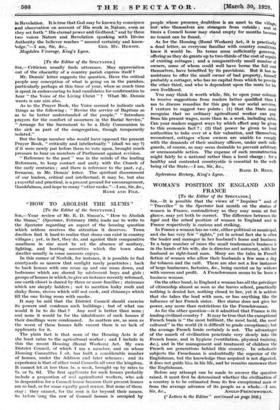WOMAN'S POSITION IN ENGLAND AND FRANCE -- [TO the Editor
of the SPECTATOR.] SIR,—It is possible that the views of " Inquirer " and of " Traveller " in the Spectator last month on the status of women in France, contradictory as they may seem at first glance, may yet both be correct. The difference between the legal and the actual position of women in England and in France respectively 'is curious and striking.
In France a woman has no vote, either political or municipal, and she has very feiv " rights," yet in actual fact she is often the leader and manager in her husband's home and business. Ida large number of cases the small tradesman's business is in the hands of his wife, 'she is director and autocrat, with her - husband as right-hand man. Many are the tales in French fiction of women who allow their husbands a few sous a day • for tobacco and the café. There are also not a few instances Of large businesses, factories, &c., being carried on by widows `with success and profit. A Frenchwoman seems to be born a business woman.
On the other hand, in England a woman has all the privileges of citizenship almost as soon as she leaves school, practically nothing is denied her, nothing dosed to her, yet it is seldom that she takes the lead with men, or has anything like the influence of her French sister. Her status does not give her power, any more than restrictions tie the Frenchwoman.
As for the other question—is it admitted that France is the leading civilized country ? It may be true that the exceptional French brain is " the most brilliant, the most lucid, the most cultured" in the world (it is difficult to grade exceptions); but the average French brain certainly is not. The advantages of the march of civilization penetrate very slowly into the French home, and in hygiene (ventilation, physical training, &c.), and in the management and treatment of children the French are generations behind this country. In scholastic subjects the Frenchman is undoubtedly the superior of the Englishman, but the knowledge thus acquired is not digested, it does not guide him in his life, and he remains narrower than the Englishman.
Before any attempt can be made to answer the question
raised, it must first be determined whether the civilization of a country is to be estimated from its few exceptional men or from the average advance of its people as a whole.—I am,
("Letters to the Editor" continued on page 509.)


















































 Previous page
Previous page